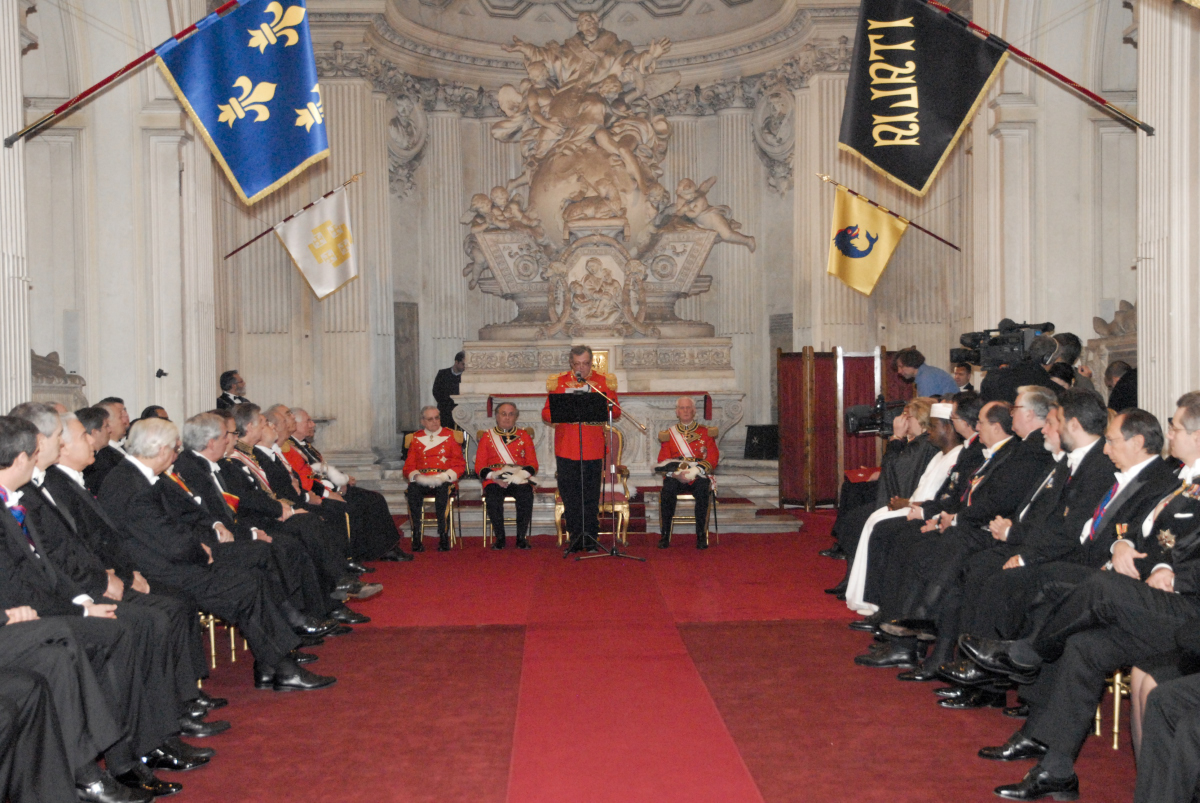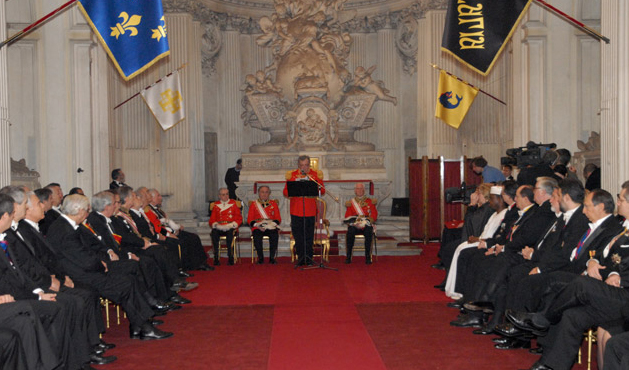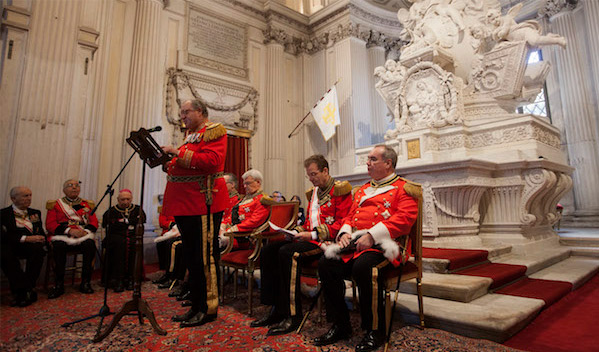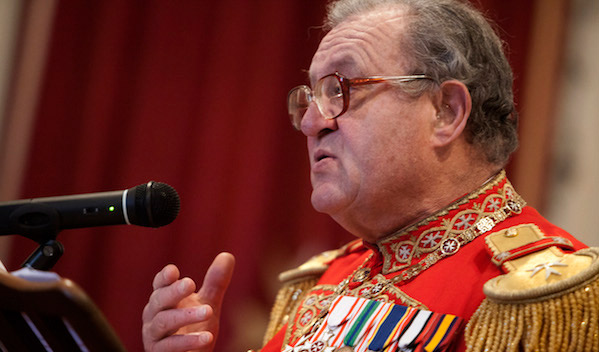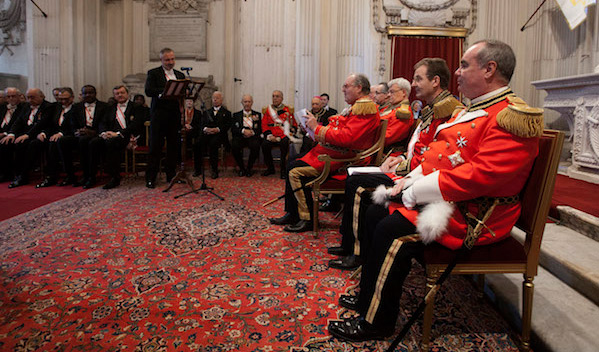This morning in the Magistral Villa on the Aventine Hill in Rome, the Grand Master of the Order of Malta received in audience the members of the Diplomatic Corps of the countries accredited to the Order for the traditional exchange of New Year greetings.
The following is the Grand Master’s address.
Dean of the Diplomatic Corps, Your Excellencies, Ladies and Gentlemen,
Once again I take pleasure in receiving today on the Aventine Hill the members of the Diplomatic Corps accredited to the Order for the traditional greetings ceremony. Besides the official significance, this is an opportunity to meet with you on a personal level and to strengthen our bonds of friendship and cooperation with the countries you represent. First of all I wish to greet H.E. the Ambassador of Honduras and to thank him for the kind remarks he addressed to me on your behalf. Your thoughtful remarks each year, Dean, encourage the Order to make even more efforts to accomplish its twofold mission throughout the world: the defence of the faith and support of the Church, and care for the sick and the poor.
This meeting also gives me the chance to express my great appreciation to the Ambassadors here present and to thank you for all you do to invigorate and deepen relations between your Governments and our Sovereign Order.
Viewing the global situation on the threshold of this new year we realise that, apart from some promising signals of greater support for peace – as the Holy Father revealed in his message on 1st January for the World Day for Peace – there are still many conditions which weigh heavily on the world: famine, the resurgence of epidemics and contagious diseases, the persistence of malaria and leprosy and the apparently inexorable progression of AIDS; as well, there are ethnical and religious conflicts, violations of human rights, violence and discrimination against women and children, racism, extreme nationalism and individualism, limitless materialism, a general moral relativism. We must add to these the increase in gratuitous violence, in anonymous terrorism by groups of unemployed young people present, rejected by the educational system and local populations, who are caught up in daily poverty and who have no other aim of existence than that of destroying things for others.
This should not demoralise us, but rather, should prompt the members of the international community to redouble their efforts to work together towards the advancement of peace, with courage and faith in God and man, as the Holy Father invites us to do in his message. There is no denying that we are living in a climate of uncertainty, a moment in history where points of reference are difficult to see or have even disappeared. Moreover, as if the human acts I have just mentioned were not enough, nature has also played its part: south-east Asia is struggling to recover after the tsunami that devastated its coasts a year ago, New Orleans is now a ghost city after the destruction wrought by hurricane Katrina in September, and a violent earthquake means those living in the mountains of Kashmir and Pakistan face a severe winter with no protection.
In this state of relentless human dramas, during 2005 the Order of Malta steadfastly pursued its mission in regions where its structures were already present or were brought in to assist:
– In Afghanistan, where we have had a presence since 2002, we aided the refugee families;
– In Sudan/Darfur, where we have been present for many years, we worked to improve the health system: 420,000 people defined as ‘refugees’ are currently benefiting from the malaria-prevention programme;
– In Romania, during the July floods;
– In August, during the food shortage in Niger and Mali;
– New Orleans, following the disaster caused by hurricane Katrina;
– Cambodia and Vietnam, with programmes for combatting leprosy;
– and, of course, south-east Asia, where a year after the tsunami, the Order’s emergency relief corps, Malteser International, pooling the medical and logistic means of all the Order’s National Associations, is working on 65 rehabilitation and reconstruction programmes in Indonesia, Sri Lanka, India and Thailand. The main objectives are basic medical treatment, psychological assistance, reconstruction of houses, schools and drinking- water distribution systems, as well as support for children and young people who have lost their parents.
80% of the 30 million euro collected by the Order’s various Associations has already been spent or invested. The future rehabilitation and reconstruction programmes need another 20 million euro, which will be covered by funds raised by the Order’s members.
These were the most important international initiatives carried out by the Order last year under its emergency relief, rehabilitation and reconstruction missions. It would take too long to illustrate here the daily work of our 56 Grand Priories, Sub-Priories and National Associations, who are present in 120 countries. But I want at least to thank warmly the Association of Italian Knights who so magnificently manage the St. John the Baptist Hospital in the Magliana district of Rome, which cares for 240 patients with serious neurological, physical or mental problems. The Association is also responsible for 12 diabetes centres distributed all over Italy, which treat 45,000 patients every year.
I also wish to give special thanks to the US Government and Congress and the Belgian Government who raised funds for a new neonatology service and for urgently-needed enlargements in our beloved Holy Family Hospital in Bethlehem, where women of all religious faiths are able to give birth safely.
To coordinate our national and international activities, the Order’s Government organised various regional conferences during 2005:
– the 13th Conference of Hospitallers of the European National Associations, held in Rome;
– the Regional Conference on the Middle East, held in Beirut at the invitation of the Lebanese Association, during which the Order’s objectives and resources for the Holy Land, Lebanon, Jordan, Syria and Iraq were redefined;
– the VIth Conference of the Americas, held in Miami at the invitation of the Cuban Association, in which representatives and ambassadors of the Order from 35 countries in Latin America, Central America and the United States participated;
– a conference for updating ambassadors to the Order on our international initiatives took place in Rome in December, in a hall kindly offered by the Chamber of Deputies. I would like to thank the Dean of the Diplomatic Corps and Ambassadors who suggested we organise this meeting, as well as all the participants. We intend to organise a similar conference in the future;
– lastly, a Regional Conference will be held at the end of February in Yaounde in Cameroun, on all the Order’s activities in Africa.
In these conferences, and especially that of the Americas which echoes the Malta conference of 2004, special attention was paid to the spiritual aspects underlying the training and life of the Order’s members, bearing in mind its nature as a religious Order.
On the diplomatic level, I wish to emphasise the excellent relations we hold with the highest ecclesiastical hierarchies of the Holy See. All the Order’s members were profoundly saddened by the death of His Holiness Pope John Paul II. We remain infinitely grateful to him for the solicitude and benevolence he always showed the Order. The Order welcomed the election of Benedict XVI, ensuring a felicitous continuity at the highest level of the Church, with joy and great hope, strengthened by the bonds of friendship between His Holiness and the Order of Malta. I will not forget the magnificent words with which he welcomed me during the mass for his enthronement: ‘May God bless the Order of Malta,’ nor the warm reception he gave us during the audience he grants every year to the Sovereign Council on the feast day of St. John the Baptist.
I would also like to stress our excellent relations with beloved Italy and express all my gratitude to the Italian Republic, with whom cooperation is equally close and friendly, as demonstrated by the meetings at the highest levels we have had with representatives of Parliament and the Government.
Last year was also marked by official visits of various representatives of friendly countries, which took place in the Magistral Palace. I wish in particular to mention the visit of the Presidents of Georgia, of Bulgaria, of Slovak and of Equatorial Guinea, as well those of the Prime Minister of Belize, of the Foreign Ministers of Burkina Faso and of Nicaragua, of the Deputy Foreign Minister of Colombia and the President of the National Council of the Slovak Republic. Our talks have enabled us to deepen the bonds of friendship and cooperation which unite us.
Also most worthy of note in 2005:
– the Order signed a framework cooperation agreement with the Food and Agriculture Organisation of the United Nations (FAO), highlighting the fact that health and nutrition aspects are closely linked;
– the Order has ratified the cooperation agreement for medical and humanitarian assistance with the Republic of Colombia;
– the Order spoke during the Second World Summit on the Information Society, which was held in Tunis, as it had done during the First Summit in Geneva two years ago;
– I am also pleased that the Republic of Angola and the Order of Malta have established diplomatic relations, bringing to 94 the number of countries with whom we have diplomatic relations.
Ambassador Dean, Your Excellencies, Ladies and Gentlemen, the Order’s Knights, Dames, volunteers and benefactors have all shown extraordinary individual dedication in their work in the fields of medical and health care and emergency relief. I thank them all warmly. They have directly contributed to the prestige and respect which the Sovereign Order today enjoys worldwide.
In thinking of them, I had the great honour to receive a prize from the ‘Path to Peace’ Foundation last November in New York, «in recognition of the exemplary charitable works carried out by the Sovereign Order of Malta». This Foundation, whose principal purpose is to spread the Catholic Church’s message of peace, was established by Cardinal Renato Martino when he was Permanent Observer of the Holy See to the United Nations. The current president is his successor to the UN, Archbishop Celestino Migliore.
Before concluding, I would like to point out that the continuing development of the Order’s activities in various countries, and especially in the Middle East and on the African continent, comes from its response to the needs expressed by local authorities, often in cooperation with United Nations agencies or other humanitarian organisations.
As laid down in the Order’s Constitutional Charter, our welfare activities have no distinction of race or religion. They are in keeping with the Order’s tradition and spirituality, demonstrated through the Christian spirit that inspires its members and its volunteers in their service to the sick and the poor, thus distinguishing the Order from humanitarian agencies.
In conclusion, I convey my warmest wishes, Your Excellencies, for the continuation of your mission, with a special regard for the heads of missions who presented their Letters of Credence to me during last year and who are participating in this ceremony for the first time: the Ambassadors of Paraguay, Egypt, Brazil, Jordan, Philippines, Togo, Austria, Guatemala, Seychelles, Malta, Croatia, Lithuania, Cuba and Russian Federation.
I profoundly hope that this new year will be full of satisfaction for the Governments you represent, for you personally and for your families, and that it will bring happiness and prosperity to the people of your countries. I trust that, with the help of God, the international community will redouble its efforts to foster the dignity of women, men, children and the family, thanks to your indefatigable action as diplomats, as the ‘artisans of peace’.








